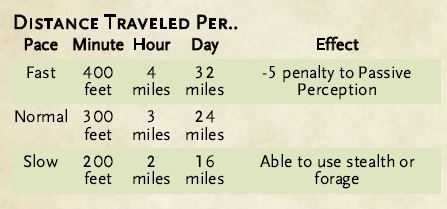Traveling
1 Hex = 3 Miles. Traveling within the wilderness can prove dangerous for even the most seasoned of veterans. While traveling, you may come upon different artifacts, wildlife, and archaic mysteries. Travel in Idriell is slightly different than what's described in in the PHB. Travel speed is affected by four factors:
* Pace, which is a base speed chosen for an entire day's travel.
* Terrain, which modifies the travel speeds shown in the table below.
* Weather, whose effects can vary widely.
* Roads, which reduces the difficulty imposed by the terrain.
Rules adapted from /r/West_Marches homebrew Traveling rules
The Travel Day
When traveling we assume that a normal day's travel allows for 8 hours of effective travel. These hours spent on the move are interspersed with mundane activities we don't normally spend time on during play. Between breaking and setting up camp, eating, measuring paths, taking breaks and seeing to other personal needs, a day is a total of about 12 hours long.Forced March
Sometimes, players may want to travel farther than is possible in 8 hours. They can push on beyond that limit, but risk exhaustion for every hour they do so. For each additional hour traveled after the 8 hours, each character must make a Constitution saving throw at the end of the hour, with a DC of 10 + (extra hours traveled). On a failed save, the character suffers one level of exhaustion.Overcoming Impassable Areas
Impassable areas are usually only impassable by normal means. They might still be navigated (probably very slowly or at great risk) by parties with special equipment or magic.Water Crossings
Crossing water safely takes time. Getting people and their gear across can take hours, and some are so large they are impassable by normal means. The DM will tell you how long it will take to cross a body of water. During winter some waterways may be frozen over, and rivers are running low. The especially frigid water and the extreme cold of the air can pose their own challenges. After every crossing of an unfrozen waterway in winter conditions, each player must make a Constitution saving throw or suffer 1 level of exhaustion . Players who fail this check by 5+ suffer 2 levels of exhaustion.Foraging in the Wild
During your travels, you may find yourselves wanting to forage for food. To forage, you must travel at a slow pace for the entire day. A character who forages successfully finds 1d6+their Wisdom modifier in pounds of food and potable water. Foraging can be abundant, moderate, scarce, or unavailable. Depending on availability, finding enough food to feed a person for a day may be more difficult. The table below describes what each of these terms mean:The Elements
The impacts of seasons and weather on travel in the wilderness can be so varied that enumerating them all mechanically is impractical. Instead, while some effects will be listed and systematized, DMs are encouraged to use weather and seasons as a narrative tool that features prominently in their descriptions, in shaping encounters, travel obstacles, and in calling for skill checks or saving throws, as it seems appropriate to them.Sleeping in Armor
When you finish a long rest during which you slept in medium or heavy armor, you regain only one quarter of your spent Hit Dice (minimum of one die). If you have any levels of exhaustion, the rest doesn’t reduce your exhaustion level. (XGE 78)Rules adapted from /r/West_Marches homebrew Traveling rules





